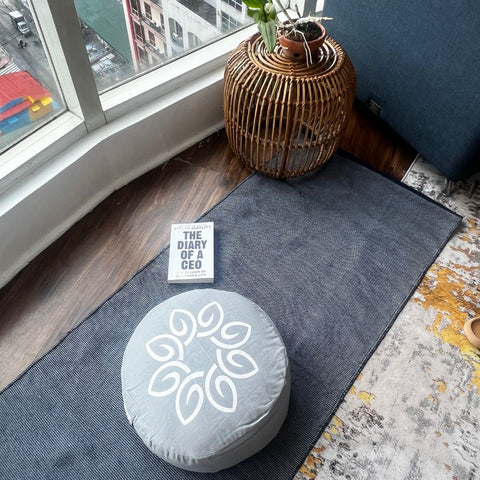The Rise of Eco-Friendly Yoga Practices
Yoga has become a global movement, with the yoga mat market valued at $13.67 billion in 2023 and projected to grow at a CAGR of 3.6% from 2024 to 2030. However, while yoga promotes mindfulness and holistic well-being, many practitioners unknowingly use mats made from environmentally harmful materials.
Around 48% of yoga mats on the market are made from polyvinyl chloride (PVC)—a material known for its durability but notorious for its environmental and health hazards. The production of PVC releases toxic chemicals, and because it is non-biodegradable, discarded mats often end up in landfills, polluting the planet for decades.
This growing awareness has led to a surge in demand for sustainable yoga gear. Gayo is leading this revolution, offering eco-friendly yoga mats that align with both personal wellness and environmental responsibility.
The Problem with Traditional Yoga Mats
Most yoga mats in the market today are made from synthetic materials like PVC, TPE (thermoplastic elastomers), and EVA (ethylene-vinyl acetate). While these materials provide cushioning and durability, they come with serious environmental consequences:
- Toxic Production Process – PVC production releases harmful dioxins, lead, and other chemicals into the environment.
- Non-Biodegradable Waste – These mats can take hundreds of years to break down in landfills.
- Health Risks – Exposure to phthalates and heavy metals used in PVC mats has been linked to hormonal disruption and other health concerns.
Given these issues, eco-conscious yogis are seeking alternatives that support their practice while reducing environmental impact.

Gayo Yoga Mats: A Sustainable Alternative
Gayo is committed to creating high-quality, eco-conscious yoga mats using natural, non-toxic, and biodegradable materials such as:
- Sustainably Harvested – Cork is derived from the bark of cork oak trees, which naturally regenerate after harvesting. This makes cork one of the most sustainable materials available.
- Superior Grip & Antimicrobial – Unlike synthetic mats, cork improves grip with moisture and naturally resists bacteria and odors.
- Durable & Long-Lasting – With proper care, cork yoga mats last longer than most synthetic alternatives.
- Chemical-Free & Breathable – Made from 100% organic cotton, this mat provides a natural, soft, and non-toxic surface for practice.
- Lightweight & Travel-Friendly – Unlike bulky rubber mats, it is easy to fold and carry, making it ideal for yogis on the go.
- Moisture-Wicking & Comfortable – Cotton naturally absorbs sweat, helping practitioners stay dry and comfortable during practice.
Both of these options not only provide high performance and comfort but also help practitioners reduce their carbon footprint while staying committed to their practice.
Why Switching to Sustainable Yoga Gear Matters
By choosing Gayo’s eco-friendly yoga mats, yogis contribute to a greener, healthier planet. Sustainability in yoga is about more than just movement—it’s about making mindful choices that align with the values of wellness and environmental care.
The Benefits of Choosing Sustainable Yoga Mats
✔ Reduces plastic pollution by avoiding synthetic materials
✔ Minimizes carbon footprint with biodegradable alternatives
✔ Supports ethical production through sustainable sourcing
✔ Enhances yoga practice with natural, skin-friendly materials
✔ Encourages a deeper connection between mind, body, and Earth
Join the Green Yoga Movement with Gayo
Eco-conscious yogis can take their practice to the next level with Gayo’s sustainable yoga mats. Every choice we make has an impact—not just on our health, but on the world around us.
Make the switch today. Visit GayoShop.com to explore our collection of eco-friendly yoga mats and start your journey towards a more sustainable practice.






